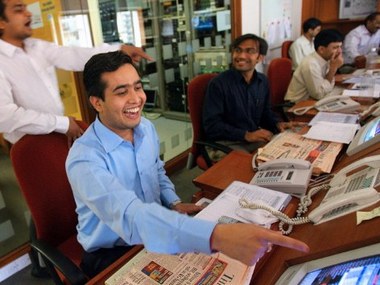Why is the Sensex on a tear when there is no sign that growth is picking up or corporate profitability is about to turn around? About the only two positives are export growth and a bountiful monsoon, but industrial output in stagnant, the investment cycle is yet to pick up, consumer confidence is weak, and inflation is still edging up and up.
However, there is some method to the market’s madness. If the Sensex today has crossed its all time high it is because market perceptions have changed. There are five reasons why the markets have begun ordering the bubbly despite the economic gloom.
#1: It is discounting the second half. The markets are beginning to discount what will happen in the second half of the year - when election spending and rural demand will pick up. The markets reckon that the economy may have bottomed out for now, and that the coming two quarters will be much better in terms of economic and corporate performance. The strengthening of the rupee is an early signal of that.
[caption id=“attachment_1168089” align=“alignleft” width=“380”]  If the Sensex is today nudging 21,000 - less than 1,000 points away from its all-time peaks in 2008 and 2010 - it is because market perceptions have changed. AFP[/caption]
#2: Adjusting for inflation.
The markets also know that share prices have not adjusted for inflation in the last five years. Investors who bought the Sensex in January 2008 have made zero or negative returns. Merely adjusting for inflation since early 2008, market prices would have to correct upwards by at least 30-40 percent some time. This suggests that the Sensex should be somewhere between 25,000-30,000 over the next one year, if all goes well. It does not mean the Sensex has to rise, but the downside risks from here look smaller than they did in 2008 and 2010 - when the Sensex last hit 21k levels.
#3: The Fed taper is now further away.
Day before yesterday, the US Fed hinted that it was still not comfortable reducing its bond buying programme in view of weak growth.
“Available data suggest that household spending and business fixed investment advanced, while the recovery in the housing sector slowed somewhat in recent months,” the policy-setting Federal Open Market Committee said. “Fiscal policy is restraining economic growth.”
This means the taper has been pushed back to probably the first or second quarter of 2014. But the recent US government shutdown following the tug-of-war between President Obama and the Republicans has caused some further economic damage. The market may be betting that the taper may be even further delayed. This means liquidity will not be an issue for as long as one can see. October has already seen $1 billion of inflows into equity.
#4: Election results on the horizon.
The markets are now beginning to see what might happen beyond the 2014 elections. If Narendra Modi scores big - as some opinion polls are beginning to indicate - the markets will soar. But even if he doesn’t, the markets expect the new government to be more committed to reform for the simple reason that there is no alternative to it. 20-21k is the floor if the BJP does not win; 30k is probably the target for the first year of a BJP-led government.
#5: Interest rates may be peaking.
Stock prices and interest rates are inversely correlated. Even though inflation has not peaked, the betting is that by early next year, or at least by April, interest rates will start falling. If that happens, stocks should start picking up steam again.
On Thursday, RBI governor Raghuram Rajan said “I won’t say that we have a set of rate hikes in mind..We think we have done enough given what we know about the economy to wait and watch and see what happens.”
None of this is guaranteed, of course, but hope springs eternal in the market’s breast. Especially when the market has been starved for returns for nearly half a decade. The markets always move in advance of reality.


)
)
)
)
)
)
)
)
)



